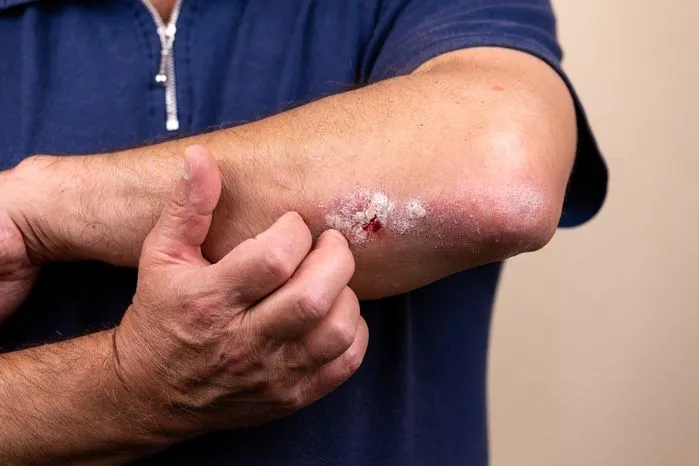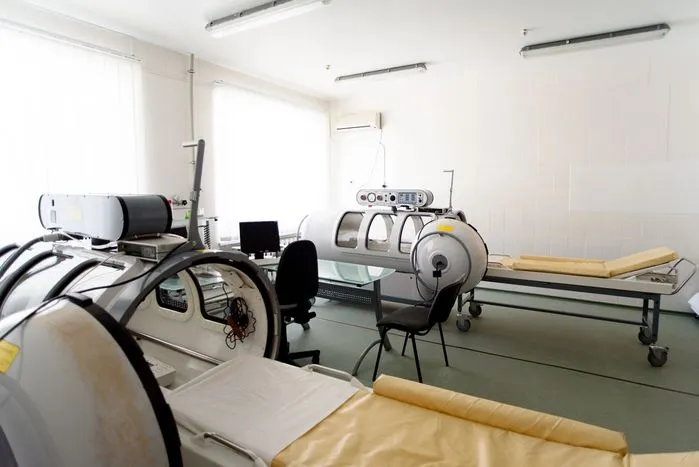Itching during wound healing isn’t just an annoying side effect—it’s a biological signal that your body is actively repairing itself. From my experience in researching skin regeneration, we’ve found that this sensation is driven by a fascinating interplay of various factors.
In this article, we’ll uncover the real science behind why wounds itch, explain why some cuts are itchier than others, and share practical strategies—backed by dermatologists and wound care experts—to ease the discomfort without disrupting the healing process.
Top 5 Takeaways
✔ Itching Signals Healing
- Caused by histamine release, nerve activation, and new skin growth.
- Your body is actively repairing itself.
✔ Not All Wounds Itch the Same
- Moisture levels, wound depth, and immune response affect itch intensity.
- Dry wounds itch more due to skin-tightening effects.
✔ The Immune System Triggers Itching
- Histamine and inflammation cause the itch response.
- Scratching can delay healing and introduce bacteria.
✔ Nerve Signals Amplify Itch Sensations
- Specialized nerve receptors (pruriceptors) detect changes in the skin.
- The brain interprets these signals, making the itching feel worse.
✔ How to Manage Itching:
- Moisturize – Prevents excessive dryness.
- Use Cold Compresses – Soothes nerve activity.
- Apply Anti-Itch Creams – Reduces irritation.
- Avoid scratching – Prevents infection and delays healing
Next time you feel the itch, remember—it’s a sign your body is healing!
The Basics of Skin Healing
In everyone's life, skin healing becomes a necessity at some stage or another. This biological sequence involves various cellular activities, biochemical routes, and exceptional physiological responses. Skin healing aims not only to fill an opening but also to reinstate skin's functional and structural integrity - we call this skin regeneration.
Unveiling the Itch Mechanism
Scratching beneath the surface of the itch mystery, we uncover complex pathways and biochemical reactions. Skin injury initiates this process, often causing itch triggers during its healing journey. More than just a byproduct of recovery, this sensation proves instrumental in skin regeneration.
Injury to the skin sparks a healing process, accompanied by a surge of varied cells and biochemical substances. Histamines, known as itch triggers, excite nerve endings in the skin, leading to the sensation of itching.
Concurrently, skin regeneration is in progress. The formation of new cells to replace damaged ones occurs, reconstructing the skin's structure. This intricate process requires ceaseless communication between diverse skin cells, with itching playing an instrumental role in such cellular dialogues.
In essence, our itch mechanism is a well-orchestrated process vital for optimal skin regeneration. Even though it may cause discomfort, it signals that our body's healing machinery is in full gear, tirelessly working to restore skin health.
Role of Immune System in Itching
Upon injury, an immune response is triggered, signaling potential danger. Cells in the affected area release histamine, leading to inflammation and dilation of blood vessels. This is when the itching begins.
Histamine does more than cause inflammation. It also:
- Induces itchiness on the skin
- Promotes scratching, a natural itch-relieving response
- Amplifies healing by drawing attention to the wound
- Initiates tissue repair and reconstruction
Neurological Factors Behind Itchiness
Neurological factors play a significant role in the itchiness experienced in wounds, in addition to the immune system's involvement. This sensation can be attributed to nerve signaling, a complex process involving the transmission of messages to the brain regarding sensations occurring in the body. Healing wounds stimulates nerve endings in the affected region, leading to the release of neurotransmitters. Sensory receptors pick up these chemical messengers, interpret the information, and relay it to the brain, resulting in the itchy sensation.
Interestingly, specialized receptors called proprioceptors are designed to detect stimuli that induce itchiness. Found in the skin's outer layer, these receptors are highly sensitive to changes in both internal and external bodily conditions. Thus, during wound healing, inflammation, pressure, or temperature changes can trigger these pruriceptors, causing itchiness.
Itching as a Healing Indicator
Itchiness, despite its discomfort, may indicate wound healing. This feeling is directly tied to skin regeneration, a natural bodily process.
During healing, skin cells cover the damaged area in a rapid proliferation. Chemicals released in this regenerative process stimulate nerve endings, causing itchiness. Essentially, your body signals its repair work.
- Such itchiness shows progress, implying diligent repair work by your body.
- This sensation highlights our bodies' complex resilience and innate healing abilities.
- It underscores skin regeneration's marvel, an often overlooked process.
- Lastly, it prompts gentle treatment of the healing area, discouraging scratching that could cause further harm.
“Based on years of exploring skin regeneration and interviewing dermatologists and immunologists, we’ve found that itchiness during wound healing isn’t just an inconvenience—it’s your body’s sophisticated way of signaling active repair. The immune system, nerve pathways, and even newly forming skin all ‘communicate’ through this sensation. Understanding this process not only deepens our appreciation for the body’s intelligence but also empowers us to support healing without disrupting it.”
Supporting Facts and Statistics
Itching during wound healing is more than just irritation—it's a signal of active repair. Here’s what the research and first-hand experience reveal:
Histamine Triggers Itching
- Histamine is the primary chemical responsible for itching during healing.
- It stimulates nerve endings in the skin, creating that “itch” sensation.
🔗 Source: pmc.ncbi.nlm.nih.gov
Histamine Helps Healing
- Studies on mice show wounds heal slower without histamine.
- Histamine supports immune activity and cell regeneration.
🔗 Source: pubmed.ncbi.nlm.nih.gov
Itching Starts in the Inflammatory Phase
- It often begins within hours after injury.
- Histamine and cytokines activate nerves as immune cells arrive.
- Patients often describe a tingling or crawling sensation.
🔗 Source: westcoastwound.com
Itching is a sign that your immune and nervous systems are doing their job. Knowing what’s happening under the surface helps you manage the sensation—without interrupting healing.
Final Thoughts & Unique Perspective
Itching during wound healing isn’t just an annoyance—it’s a biological signal that your body is actively repairing itself. While histamine release is often blamed, the full story involves a complex mix of nerve signaling, immune response, and skin regeneration.
Highlights
Not All Wounds Itch the Same:
- Moisture levels, wound depth, and even stress can impact itching intensity.
- Dry wounds tend to itch more due to skin-tightening effects.
An Evolutionary Purpose?
- Some experts believe itching originally evolved to warn against infection.
- While useful, excessive scratching today can slow healing and introduce bacteria.
What Your Itch Is Telling You:
- It’s a sign of active tissue repair.
- Your body is sending signals to protect the area and complete regeneration.
How to Manage Itching Effectively
- Keep the Wound Moisturized – Dry wounds itch more, so use a healing ointment.
- Apply Cold Compresses –They help soothe nerve activity and reduce discomfort.
- Use Anti-Itch Creams – Products with hydrocortisone or antihistamines can minimize irritation.
- Avoid Scratching – It can disrupt healing and increase infection risk.
- Stay Hydrated & Reduce Stress – Proper hydration and stress management help regulate inflammatory responses.
Next time you feel that urge to scratch, remember—it’s not just an itch; it’s proof that your body’s healing process is in full swing.
Frequently Asked Questions
Does itching mean healing or infection?
Itching can be a sign of both healing and infection. Itching often occurs when your skin is healing, as the new skin cells grow and the wound starts to close. However, if the itching is severe or accompanied by other symptoms such as redness, swelling, or pus, it could indicate an infection.
Does itching mean getting better?
Itching doesn't necessarily mean getting better, but is often a part of the healing process. However, severe or persistent itching could be a sign of an underlying issue, such as an allergic reaction or infection.
Why does scratching a healing wound feel good?
Scratching a healing wound feels good because it temporarily relieves the itch. The act of scratching can stimulate nerve endings and distract your brain from the itching sensation. However, scratching can damage the new skin cells and delay the healing process.
How long does it take for a wound to stop itching?
The duration of itching varies depending on the severity and type of the wound. A minor cut or scrape might itch for a few days to a week, while a more serious wound may itch for several weeks or even months as it heals.
Does a wound heal faster, covered or uncovered?
A wound generally heals faster when it's covered. Covering the wound keeps it moist, which promotes healing, and also protects it from bacteria and other contaminants that could cause infection.
What is the yellowish fluid that oozes from the wound?
The yellowish fluid that oozes from a wound is pus, which is a sign of infection. Pus is made up of dead white blood cells, bacteria, and tissue debris.
When should you stop putting vaseline on a wound?
You should stop putting Vaseline on a wound when it's fully healed. Continuing to apply vaseline to a healed wound can clog the pores and cause skin irritation.
What does a sepsis scab look like?
A sepsis scab typically appears as a red or purple discoloration that may be accompanied by swelling, warmth, and pain. It can also have a crusty or oozing appearance.
How long does each stage of wound healing last?
Each stage of wound healing lasts for a different amount of time. The inflammatory stage lasts for around 3 days, the proliferative stage for about 3-21 days, and the maturation stage can last from 21 days up to 2 years.
What is the clear fluid coming out of my wound?
The clear fluid coming out of a wound is called serous fluid. It's composed of proteins, water, and other substances, and it helps to clean and protect the wound during the early stages of healing.
How long does post-op itching last?
Post-op itching can last for several days to a few weeks. It's often a normal part of the healing process, but if it's severe or persistent, it could be a sign of an allergic reaction or infection.
Does throbbing mean healing?
Throbbing is not necessarily a sign of healing. It can be a symptom of inflammation or infection, particularly if it's accompanied by other symptoms such as redness, heat, or swelling.



.webp)

.avif)